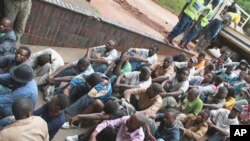Forty-six people in Zimbabwe, charged with high treason, appeared in court in Harare Thursday.
Defense lawyer Alec Muchadahama said he estimates 10 of the defendants in court were having difficulty sitting down or walking.
He said they claimed they were assaulted in detention at Harare Central Police Station after their arrests last Saturday. He said some of the defendants were denied access to medical attention.
Muchadahama said that after lengthy arguments and delays, the case was postponed until Monday.
He said the state said it needed more time to prepare its case. Muchadahama said he will apply on Monday for charges to be dropped against the 46.
The states claims the group, including 11 women, were watching videos and engaged in discussions to formulate a plot to overthrow President Robert Mugabe. Police also say the group should have secured official permission to hold their meeting.
President Robert Mugabe has regularly used treason charges against his political opponents since he came to power in 1980.
Morgan Tsvangirai, leader of the Movement for Democratic Change and prime minister in the unity government was charged with high treason weeks before he first challenged Mr. Mugabe in presidential elections in 2002.
The best known of the group of 46 now being charged is Munyaradzi Gwisai, a law lecturer at the University of Zimbabwe and head of the Harare branch of the International Socialist Organization. He was previously a legislator for the MDC but was expelled because he supported Mr. Mugabe’s seizures of white-owned land.
Another in the group, Hopewell Gumbo is a former student leader, now employed by a non-governmental organization in rural areas working with farmers.
He is one of those who allege he was assaulted in detention.
In a recent interview with VOA, Gumbo said politics affected farmers regardless of whether they were Zanu PF or MDC. "I personally work for an organization that has started an initiative with the rural cotton farmers, in terms of pricing of their commodities, that kind of strategy goes above political differences because when Zanu PF and MDC farmers meet they realize their problems are common and political issues can only divide them at the end of the day," he said.
The people in the group charged with treason, which carries the death sentence, claim they met regularly to discuss international political events, particularly as they affect the working class.
Zimbabwe Activists Charged with High Treason




